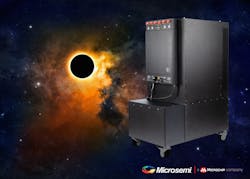Microsemi releases MHM 2010 active hydrogen maser for applications that require low phase noise and extreme frequency stability
CHANDLER, Ariz., - The world depends on commercially available maser atomic clock technology to deliver precise frequency and timing for applications including metrology, deep space research and global navigation. Microchip Technology Inc., via its Microsemi subsidiary, is meeting the needs of these applications with the MHM-2020, its hydrogen maser atomic clock that improves typical long-term stability performance by nearly 10 times over the previous generation MHM-2010.
Building on the MHM-2010's long service life and cost of ownership legacy, the MHM-2020 offers an upgraded user experience with a color touch panel display and secure network management port.
Hydrogen masers deliver stability by operating on the principle that hydrogen atoms, in the proper environment, emit microwaves at a precise 1420405751 Hertz (Hz) frequency. Phase-locking this extremely small-power and high-purity signal to a very high-performance quartz oscillator delivers a clock output signal with the necessary long-term stability and phase noise to enable precise time keeping. Active hydrogen masers are the most advanced commercially available atomic clocks produced by Microchip, quadrupling the stability of passive hydrogen masers while providing superior short-term stability compared to cesium beam tube atomic clocks.
Designed and manufactured in the U.S., the MHM-2020 maser uses a novel drift-compensation feature to improve long-term clock-drift and aging performance, which is critical for metrology and timekeeping applications. Its improved performance makes the MHM-2020 the preferred choice of national labs that work with Bureau International des Poids et Mesures (BIPM) standards for maintaining Coordinated Universal Time (UTC) worldwide, enabling users to attain <3E-16/day long-term aging along with improved temperature stability (tempco) and lower magnetic field sensitivity. The maser's short-term clock stability performance between 1-100 seconds range meets the stringent requirements of Very Long Baseline Interferometry (VLBI) for radio astronomy research such as studying black holes and other applications that require a low noise, precise frequency and timing reference.
The MHM-2020 76001-20X active hydrogen maser and upgrade package for users of applicable legacy MHM-2010 masers are both available. The maser can be specified with an optional low phase noise packaging option. Microchip supports the maser with clock maintenance, on-site repair and consulting services, as well as an extended warranty.
For additional information, please visit https://www.microchip.com/.
